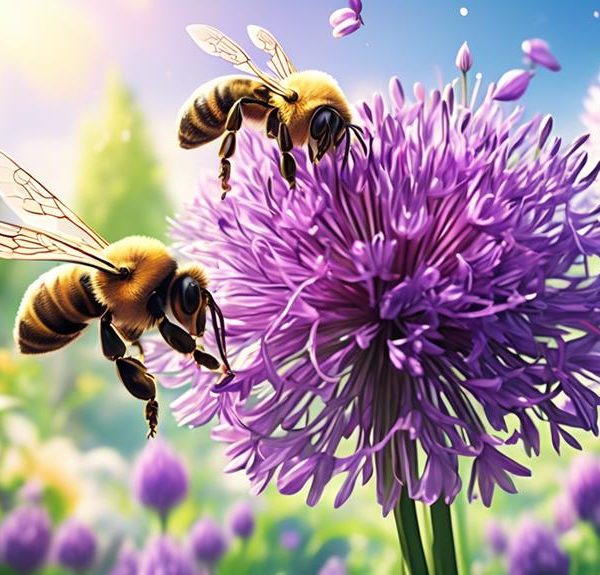Feast or famine? Discover the fascinating relationship between bees and aloe vera in our exploration of nature's complex dance of pollination.
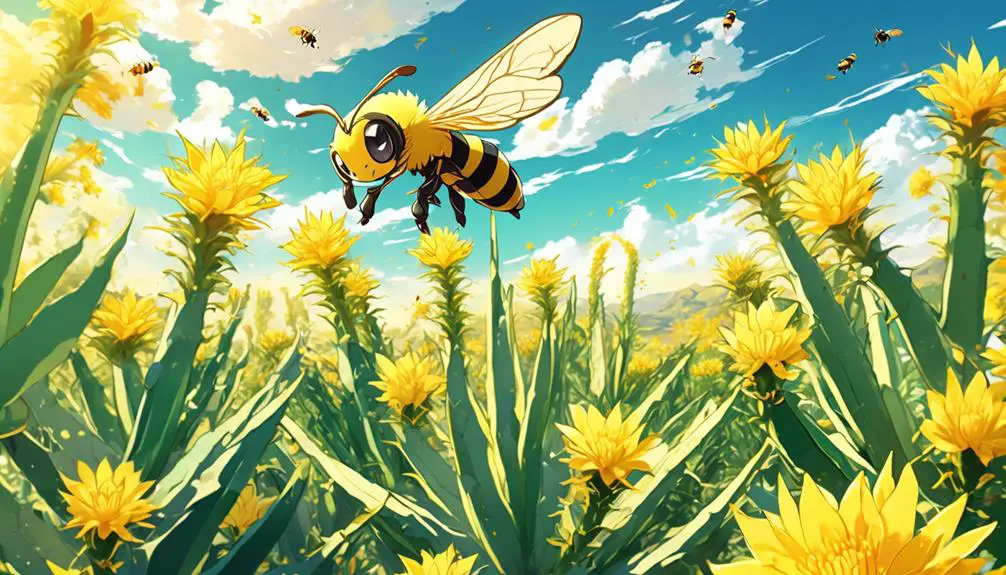
Do Bees Like Aloe Vera?
Just as a compass naturally aligns to magnetic north, you may find yourself drawn to the symbiotic relationship between bees and plants.
Today, we're going to navigate the uncharted territory of bees' affinity for aloe vera.
You might assume that all flowers and plants are a paradise for bees, but is this truly the case with aloe vera?
The answer to this question isn't straightforward, as it involves a deeper exploration of bee behavior, plant characteristics, and the intricate dance of pollination.
Are you ready to embark on this fascinating journey to discover whether bees and aloe vera are nature's unsuspected allies?
Key Takeaways
- Bees are instinctively attracted to Aloe Vera flowers due to their bright colors and substantial amounts of nectar.
- Aloe Vera is a valuable plant with medicinal properties and various applications in skincare, pharmaceuticals, agriculture, and more.
- The interaction between bees and Aloe Vera is an example of mutualistic symbiosis, where bees benefit from the food source and Aloe Vera benefits from pollination.
- Bees play a crucial role in pollination, maintaining biodiversity, and ensuring global food security, making Aloe Vera an important resource for their health and well-being.
Understanding Bee Preferences
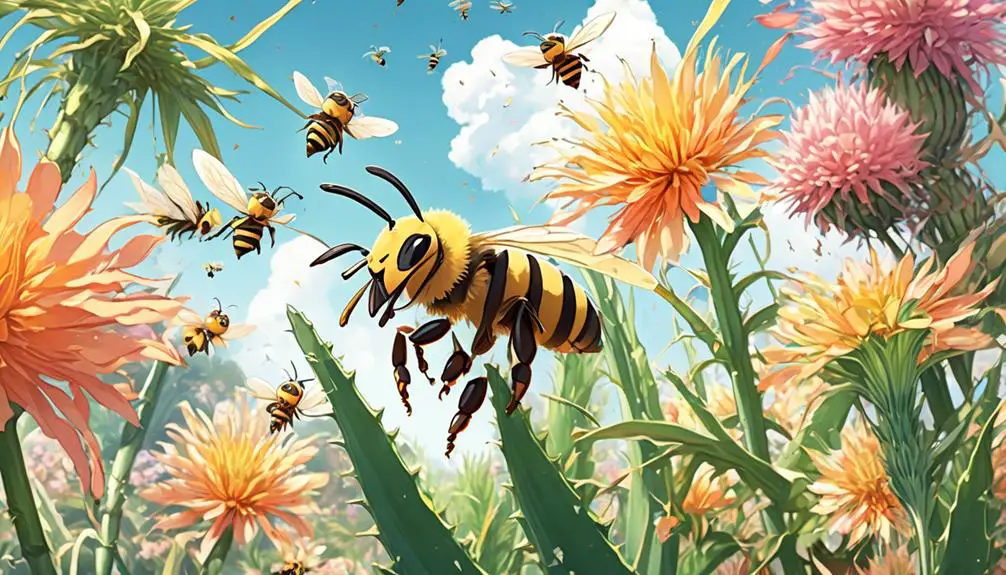
To comprehend why bees are particularly drawn to Aloe Vera plants, it's important to delve into the specific preferences and behaviors of these fascinating pollinators. You should understand that bees are driven by an instinctive desire to collect nectar and pollen, the primary sources of their nutrition.
Now, let's focus on what makes Aloe Vera so attractive. The flowers of this plant produce substantial amounts of nectar, rich in sugars, which is a high-energy food for bees. The plant's unique color spectrum also plays a key role. Bees see color differently than humans do. They're attracted to bright colors that fall in the blue to ultraviolet range, and Aloe Vera's vibrant flowers fit that description perfectly.
Moreover, the shape of Aloe Vera blossoms is conducive to bees' feeding habits. The tubular form allows bees easy access to the nectar, enabling efficient collection.
The Importance of Aloe Vera
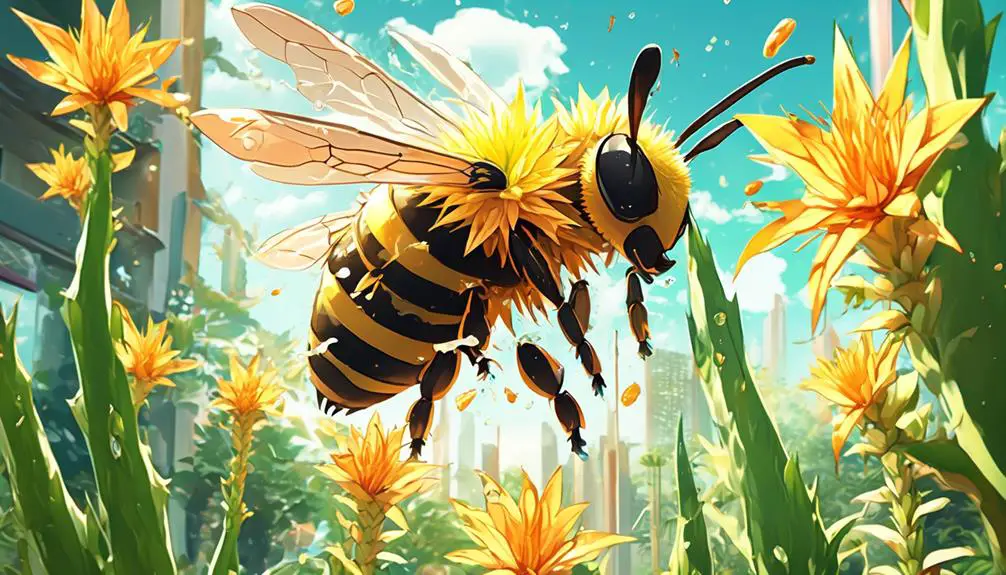
Beyond its appeal to bees, Aloe Vera holds immense importance in various fields owing to its rich medicinal properties and wide-ranging applications. This succulent plant, native to North Africa, Southern Europe, and the Canary Islands, is a powerhouse of benefits.
You'll find it predominantly in skincare products due to its impressive hydrating capabilities. It's rich in antioxidants and vitamins A, C, and E, which help to nourish the skin and fight against signs of aging. In the pharmaceutical world, it's recognized for its anti-inflammatory and antibacterial properties, making it a potent ingredient in creams and ointments for burns, wounds, and skin irritations.
In the culinary field, you may not be aware that Aloe Vera is edible. It's often used in beverages and salads for its detoxifying properties. Researchers have also found that it can aid digestion and boost the immune system.
In agriculture, it's used to improve soil quality and crop yield. It's versatility extends to the industrial sector where it's used in the production of biodegradable plastics.
Bees' Interaction With Aloe Vera
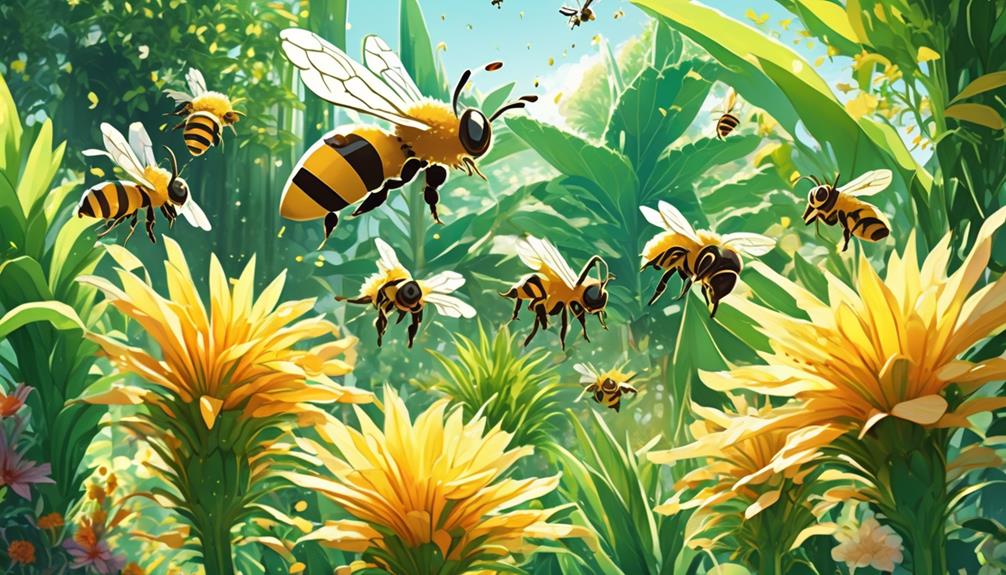
While the versatile applications of Aloe Vera are certainly impressive, it's equally fascinating to explore how bees interact with this succulent plant. Aloe Vera's flowers are a veritable feast for bees, providing both nectar and pollen, two essential components of a bee's diet. The plant's long blooming period, from late winter into early summer, also makes it an attractive and reliable source of sustenance for bees.
You might wonder how the bees' attraction to Aloe Vera benefits the plant. The answer lies in the process of pollination. When a bee lands on an Aloe Vera flower, it inadvertently picks up pollen on its body. This pollen is then transferred to the next flower the bee visits, facilitating the plant's reproduction.
Aloe Vera's relationship with bees is a classic example of mutualistic symbiosis, where both entities derive benefits. Bees get a rich food source, and Aloe Vera gets assistance in its propagation. Understanding this interaction can help us appreciate the interconnectedness and delicate balance of our ecosystem. So, next time you see a bee buzzing around an Aloe Vera plant, you'll know it's not just there for the sweet nectar.
The Role of Bees in Pollination
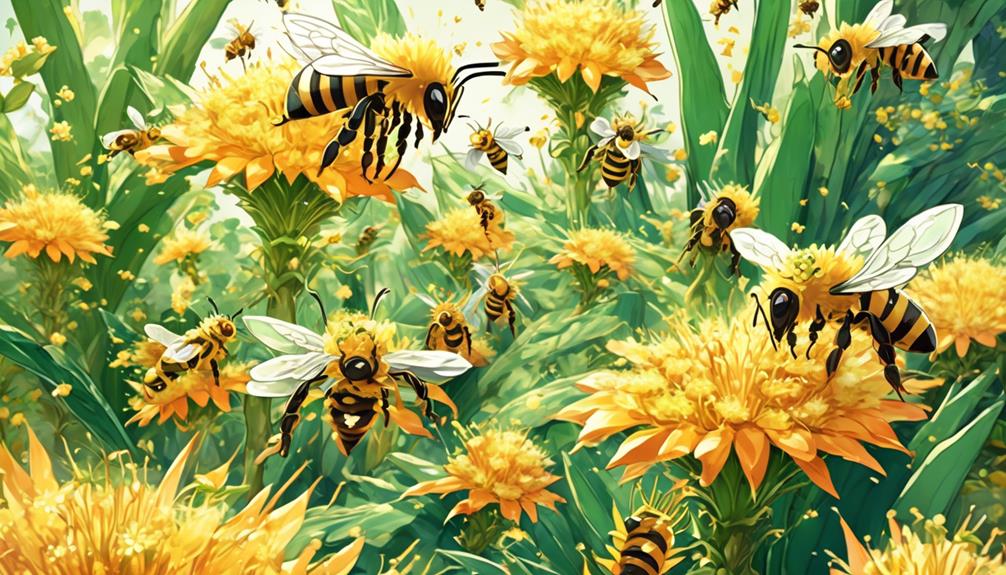
Delving into the intricate process of pollination, you'll discover that bees play a pivotal role, acting as nature's most industrious and efficient pollinators. You might wonder why bees are so crucial. Well, it's because they're responsible for the propagation of most plant species. As bees flit from flower to flower, collecting nectar, they inadvertently transfer pollen grains from the male parts of a flower (anthers) to the female parts (stigma) of the same or another flower, thus facilitating fertilization.
Understanding the crucial role bees play in maintaining biodiversity is essential. Without these diligent workers, many plant species wouldn't reproduce, disrupting food chains and ecosystems. They're the unseen labor behind your favorite fruits, vegetables, and even the cotton in your clothes.
You'll also find that bees' pollination services extend beyond nature's realm into agriculture. Farmers around the world rely heavily on bees to pollinate their crops, enhancing production and quality. Without bees, global food security would be under serious threat.
Impact of Aloe Vera on Bee Health
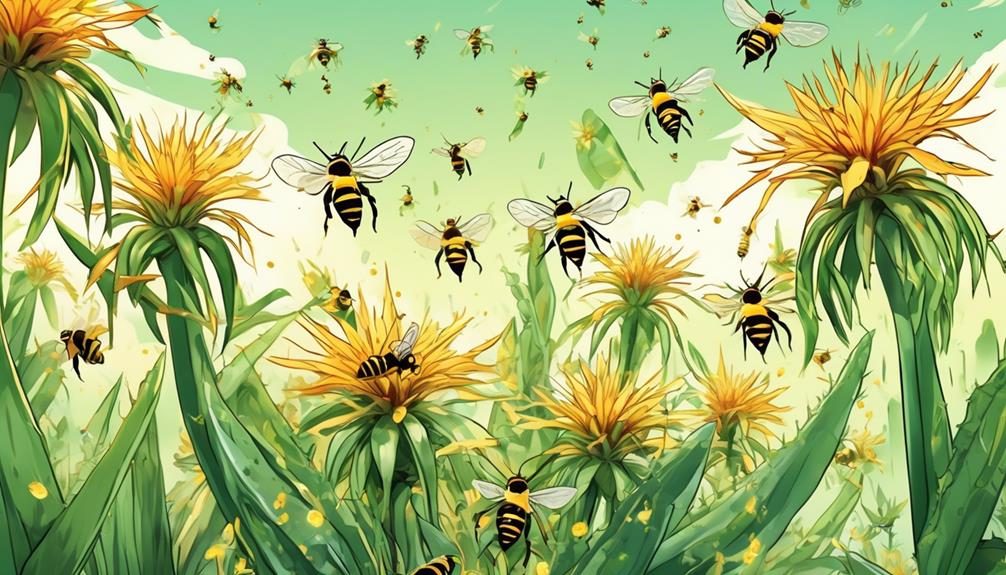
Turning our attention to the impact of Aloe Vera on bee health, it's intriguing to note that this medicinal plant can potentially bolster the immunity and overall wellbeing of these vital pollinators. The nectar of Aloe Vera, rich in amino acids, vitamins, and minerals, provides an excellent nutritional source.
You might be wondering how this affects a bee's health. Let's delve into it. The amino acids are essential for protein synthesis, which aids in the growth and development of bees. Vitamins and minerals, on the other hand, are critical for their metabolic processes and immune system function.
Further, Aloe Vera's anti-microbial properties can protect bees from harmful pathogens. Certain bacteria and fungi, detrimental to bee health, are neutralized by the plant's compounds. Additionally, Aloe Vera nectar's high water content can help bees stay hydrated, particularly in hot and dry climates.
Frequently Asked Questions
How Does the Climate or Geographical Location Affect the Bees' Attraction to Aloe Vera Plants?
Climate and location greatly impact a bee's attraction to certain plants. If you're in a cooler climate, bees may not be as attracted to aloe vera because it thrives in warm, sunny conditions. Similarly, if you're in a dry, desert-like region, bees may find aloe vera more appealing than in a damp, cloudy area.
It's all about matching the plant's natural habitat to the bee's preferences.
What Other Plants Are Bees Attracted to Other Than Aloe Vera?
You're curious about what other plants attract bees, aren't you?
Well, aside from aloe vera, bees are particularly drawn to lavender, salvia, and sunflowers.
They're also fond of thyme, rosemary, and even apple trees when they're in bloom.
It's actually quite a long list, but these are some of the most common ones.
How Does Aloe Vera Compare to Other Plants in Terms of Nectar Production?
When comparing aloe vera to other plants in terms of nectar production, it's not at the top of the list. While it does produce nectar, plants like lavender, sage, and sunflowers typically produce more.
These plants are more attractive to bees due to their higher nectar output. So while bees will visit aloe vera, they're likely to prefer other plants if given the option.
It's all about the nectar quantity for these hard-working critters.
Are There Any Specific Species of Bees That Prefer Aloe Vera More Than Others?
You're asking if certain bee species prefer aloe vera over other plants. While all bees can feed on aloe vera, honey bees are particularly attracted to it. This is due to the plant's high nectar production, which honey bees rely on for food.
Can Bees Help in the Propagation of Aloe Vera Plants Through Cross-Pollination?
Absolutely, bees can assist in the propagation of aloe vera plants through cross-pollination. When a bee lands on an aloe flower, it picks up pollen. As it travels to another flower, some of that pollen rubs off, fertilizing the second flower. This process helps in the creation of new seeds, leading to the growth of new aloe vera plants.
Conclusion
In conclusion, bees do interact with aloe vera, but it's not their top preference. However, its importance can't be underestimated as it aids in bee health.
Bees play an essential role in aloe vera pollination, contributing to the plant's reproduction. While aloe vera isn't a bee's first pick, it plays a part in the grand scheme of bee life and plant biodiversity.
So, it's safe to say, bees and aloe vera have a symbiotic relationship.

